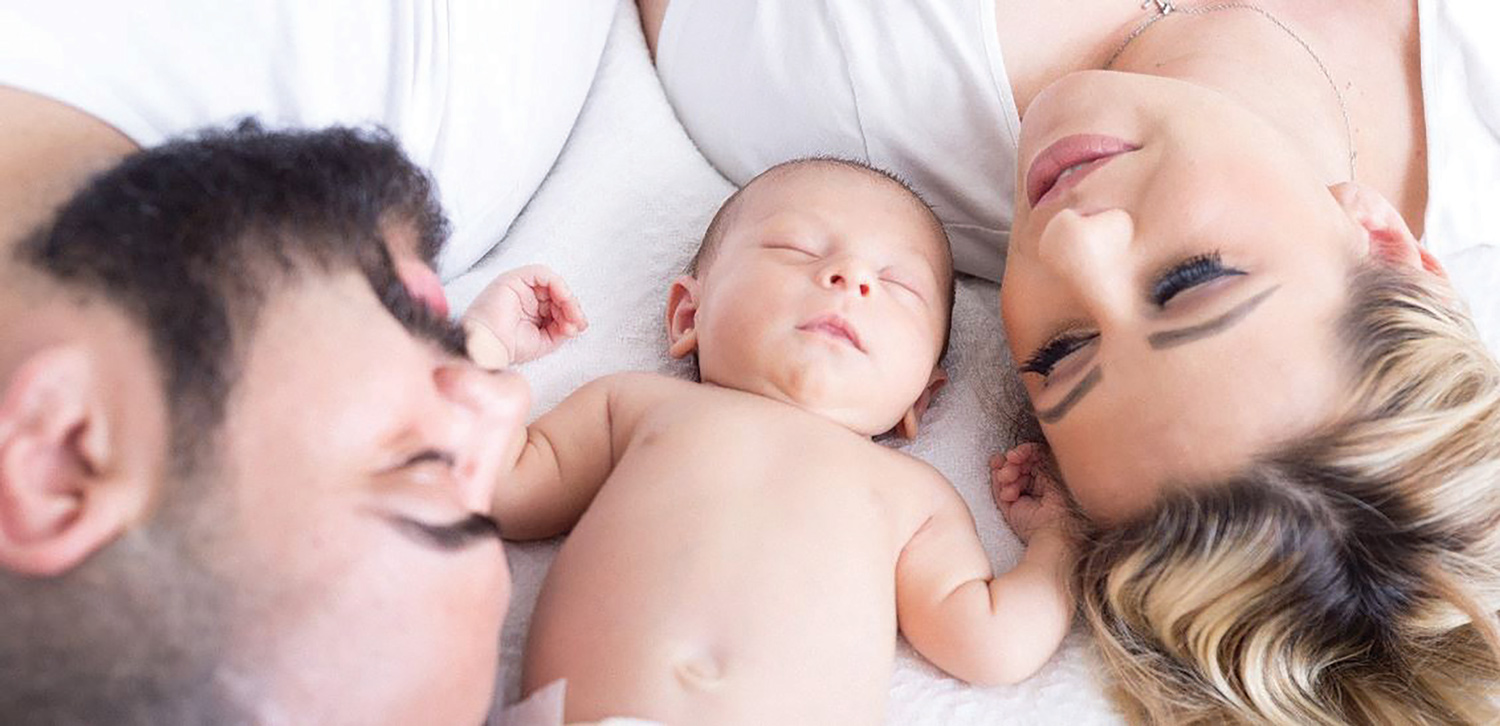 Sleep baby sleep
Sleep baby sleep
A study by researchers at the University of Western Australia and Flinders University has found a serious lack of expertise in health professionals when it comes to treating sleep problems in children.
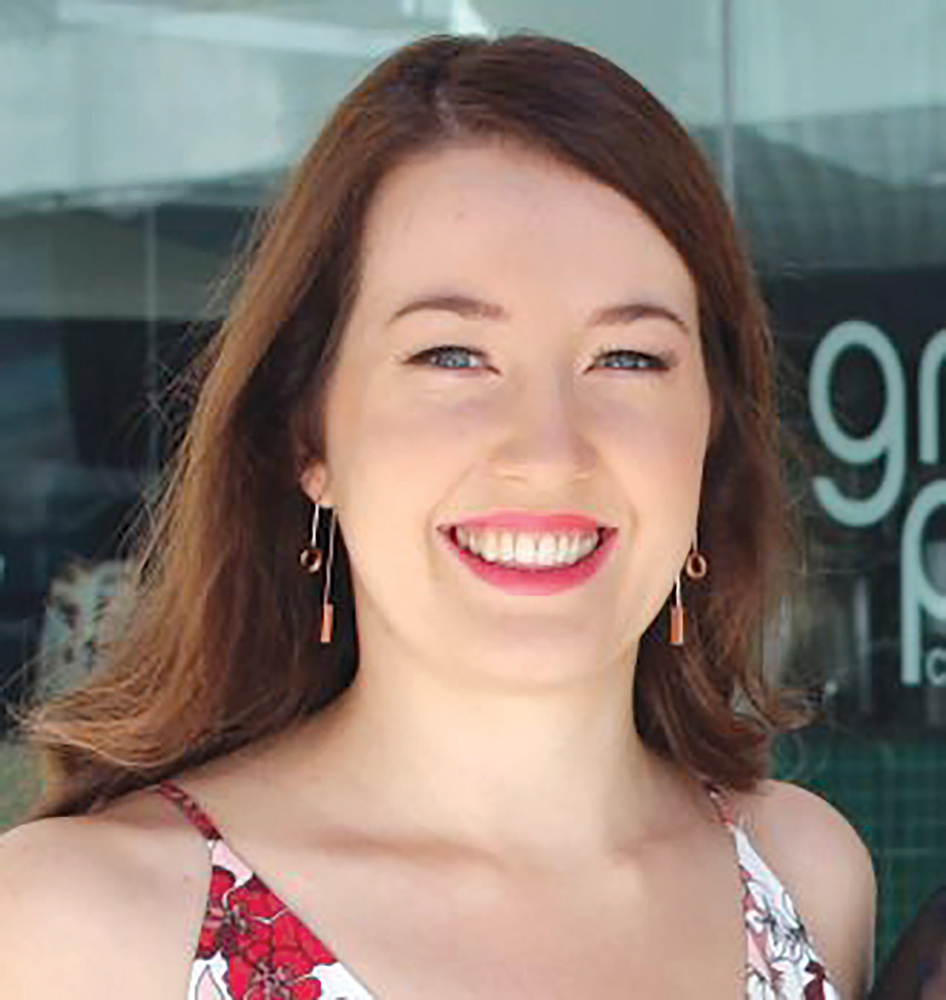
The research, published in Sleep Medicine, surveyed 263 Australian health professionals and revealed a significant shortfall in the knowledge, understanding and skills to identify manage and prevent paediatric sleep disorders.
Sleep disorders are common in Australian children, with studies indicating up to 30% of children may experience sleep problems ranging from unsettled newborn babies to restless teenagers.
Lead author Dr Cele Richardson, from UWA’s Centre for Sleep Science, said health professionals received little training in sleep medicine during their degree and it was likely this lack of training adversely affected their clinical practice.
“We found about one-third of the health professionals were not routinely screening for sleep disorders in paediatric patients and many were not routinely recommending evidence-based treatments,” she said.
“One common reason for not screening for sleep problems was the belief that parents would report poor sleep if it were a problem.”
Music to the ears
Researchers at Murdoch University’s Centre for Healthy Ageing are working to identify how music can be used to manage dementia.
Previous research suggests listening to or singing songs could provide emotional and behavioural benefits for the estimated 472,000 people living with dementia in Australia.
The new project will investigate the effects of personalised music on their quality of life.
The centre’s director Associate Professor Hamid Sohrabi said aged-care facilities faced challenging behaviours associated with dementia such as agitation, depression and anxiety.
“Typically, these symptoms are treated with antipsychotic and sedative medications, but they have limitations in helping people with dementia,” Prof Sohrabi said.
“Personalised music delivered via headphones can moderate symptoms of dementia, with daily music exposure appearing to have at least temporary positive impact on the moods and behaviours.
“What we’re exploring is the ideal dosage and duration of music intervention.”

Funding ahead
Professor Camile Farah and his team at the Australian Centre for Oral Oncology Research and Education have been awarded $2.2m by the Federal Government’s $20 billion Medical Research Future Fund to continue its work into the genomic profile of head and neck cancers.
The project, evaluating clinically relevant biomarkers to improve early detection and treatment of head and neck cancer, will be carried out with colleagues at the Peter MacCallum Cancer Centre, Genomics for Life, Icon Cancer Centre, and CSIRO.
Snack attacks in lockdown
Not surprisingly, Australians have turned to comfort food to ease the pain of COVID lockdowns, a new study in Appetite shows.
English and Australian professors compared notes about experiences in the UK and Australia to warn about the effect of extended pandemic lockdowns on our waist-lines. Their study confirmed that the small luxuries, from sweets and chocolate to salty treats, have helped to lift our spirits – and kilojoule intake – during lockdowns.
Despite having more time at home to prepare healthy food, the intake of high-energy density food has risen for many. Top of the list of lockdown snacks are chocolate, cake, ice cream and pizza.
But while more than half of respondents reported increased snack intake, 26% reported decreased intake and 20% reported no change to the amount they ate during the lockdown.
Support for sugary drinks tax
Silver Chain Group is supporting calls for a tax on sugary drinks to encourage people to make healthy choices. CEO Dale Fisher said it was time for Australian authorities to consider a tax to help save lives and millions of dollars in healthcare costs.
“We’ve long known that sugary drinks such as soft drinks have no nutritional value, we don’t need them in our diet,” Ms Fisher said.
“Overseas jurisdictions that have introduced a tax on sugary drinks have found that it does result in reduced consumption of drinks. The tax also resulted in manufacturers reformulating more of their products so there was a greater choice of reduced-sugar drinks and non-sugar drinks.”
A tax on sugar-sweetened drinks has been championed by organisations including Diabetes Australia and the Australian Medical Association.
Fish oil takes on superbugs
For the first time, Australian scientists have confirmed a link between the role of regular fish oil to break down the ability of ‘superbugs’ to become resistant to antibiotics.
The discovery, led by Flinders University, found that the antimicrobial powers of fish oil fatty acids could prove a simple and safe dietary supplement for people to take with antibiotics to make their fight against infection more effective.
Microbiologist Dr Bart Eijkelkamp, from the Bacterial Host Adaptation Research Laboratory at Flinders, said studies indicated that a major antibiotic resistance mechanism in cells could be negatively impacted by the uptake of omega-3 dietary lipids.
“In the experiments, and complementary supercomputer modelling, we found that these fatty acids in fish oil render the bacteria more susceptible to various common antibiotics.”
The researchers said this chink in the armour of harmful bacteria was an important step forward in combatting the rise of superbugs that are developing multi-drug resistance to antibiotics.
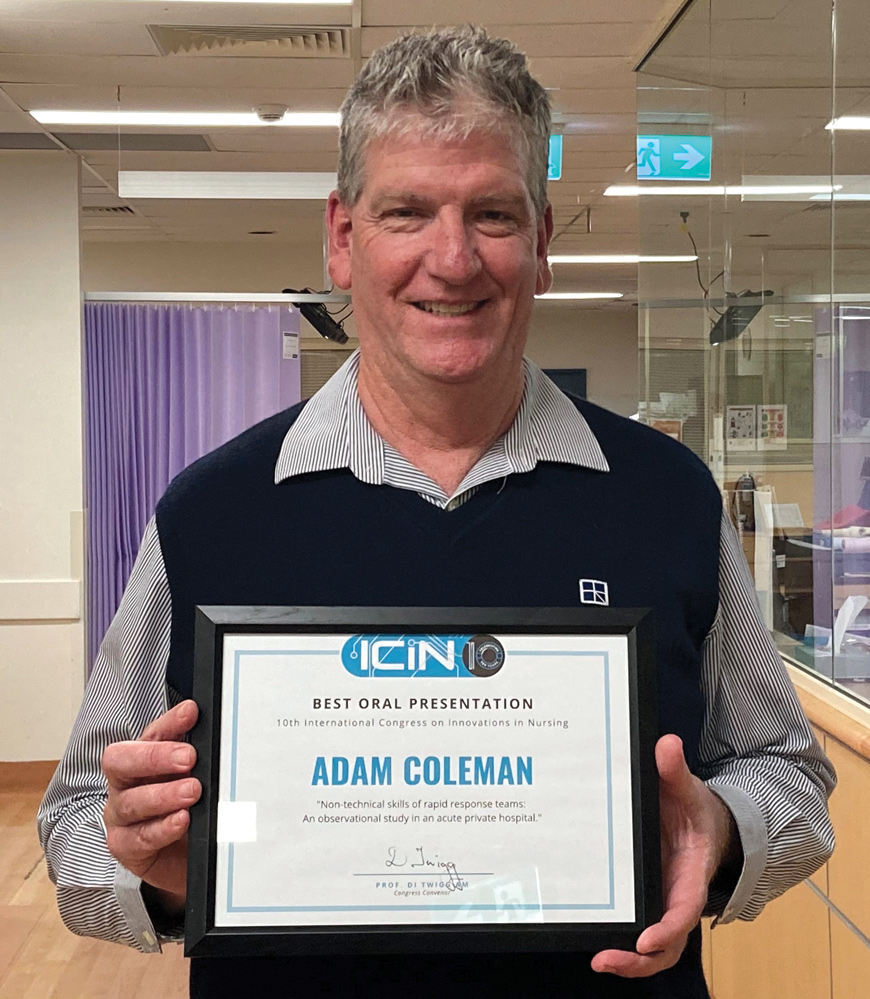
Rapid response rewarded
Research into rapid response teams at Hollywood Private Hospital is gaining international traction.
A study of the non-technical skills of medical emergency teams was led by Dr Rosemary Saunders and conducted by researchers from Hollywood and Edith Cowan University’s School of Nursing and Midwifery.
Hollywood Clinical Nurse Manager Adam Coleman shared the research at the recent International Congress on Innovations in Nursing in Perth and won the Best Oral Presentation Award.
The study was published in the June edition of Australasian Emergency Care. Mr Coleman has also been invited to present the research in Zurich, Switzerland, in October.
“Medical emergency teams are essential in responding to acute deterioration of patients in hospitals, requiring both clinical and non-technical skills,” Mr Coleman said.
“Our findings emphasise the importance of non-technical skills in resuscitation training and well-developed processes for medical emergency teams.”
Mr Coleman is now making improvements in the processes of Hollywood’s medical emergency teams. The project was funded by the Hollywood Private Hospital Research Foundation.
Future funds
A raft of health-based projects led by Curtin University have been awarded nearly $1.5 million dollars in funding by Healthway and the West Australian Future Health Research and Innovation Fund.
Successful projects include a collaborative community program to support WA Culturally and Linguistically Diverse women experiencing domestic violence, measuring the use of e-cigarettes in young people, and reducing the risks of harm for Aboriginal and Torres Strait Island people using illicit drugs.
Predicting breast cancer risk
For the first time, Australian women with non-invasive breast cancer will have access to an innovative test to help predict outcomes and inform personalised treatment plans.
Almost 20,000 women are diagnosed with breast cancer in Australia each year, with Ductal Carcinoma in situ (DCIS) – a common form of non-invasive breast cancer – accounting for up to one in five cases.
GenesisCare says combining the latest innovations in molecular biology with artificial intelligence, DCISionRT is a precision medicine test for women diagnosed with DCIS who have undergone breast-conserving surgery. The test assesses the 10-year risk of DCIS returning or progressing to local invasive breast cancer and predicts whether radiation therapy will be of additional benefit to surgery alone.
Finding cancer early
PanKind, the only foundation in Australia dedicated to pancreatic cancer, has launched an early detection initiative. Currently, there is no way to test or find pancreatic cancer early, and if you have inoperable pancreatic cancer, 80% of patients survive only 6-12 months. But screening all Australians for pancreatic cancer is not a viable option.
PanKind has awarded $465,000 to two new research projects with QIMR Berghofer Medical Research Institute and the Jreissati Family Pancreatic Centre to increase the proportion of patients diagnosed with operable disease through early detection.
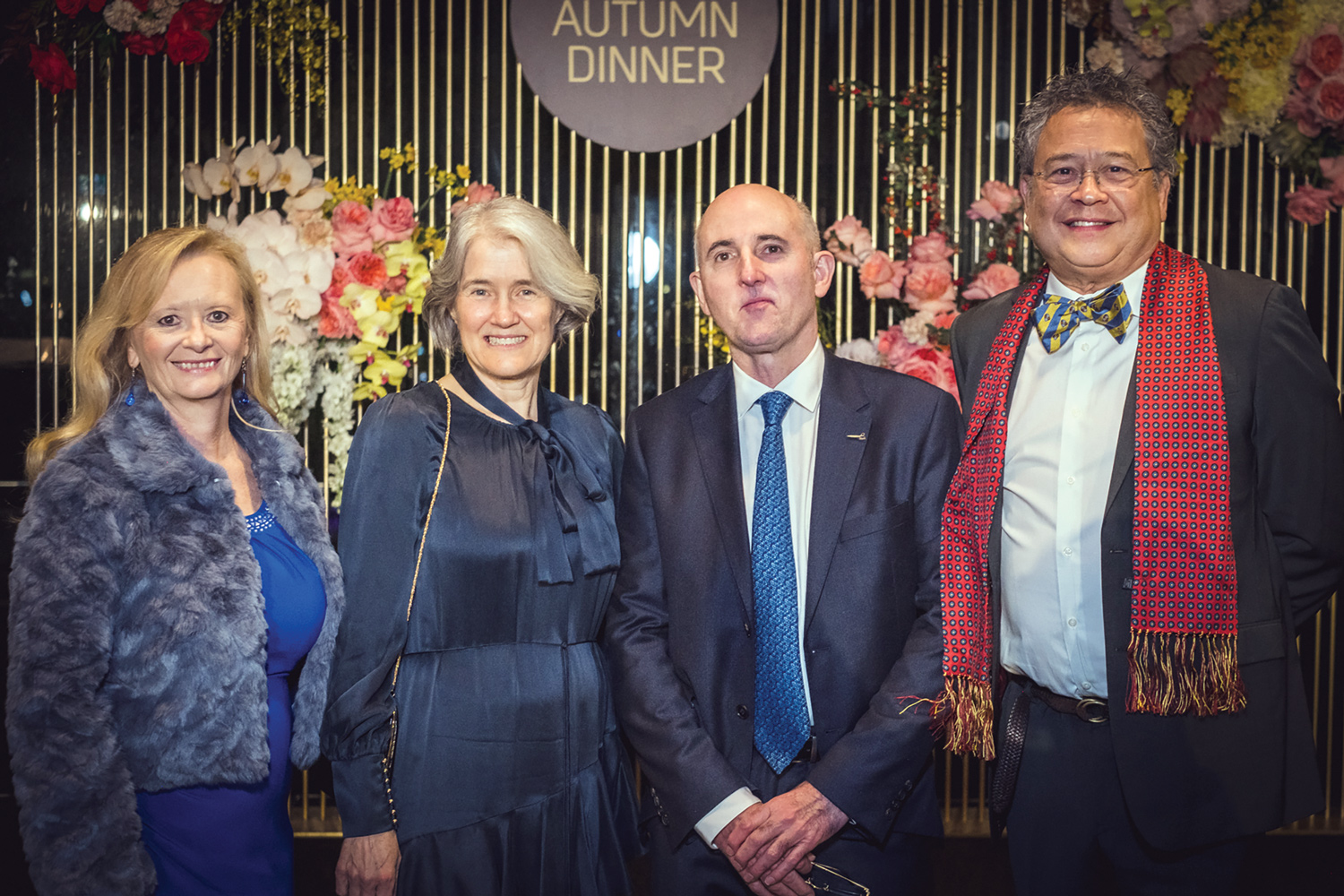
Dr Erica Shellabear, Mr Steve Archer and Prof Lincoln Brett.
Hospital milestones
St John of God’s Subiaco and Murdoch hospitals recently held social functions to recognise their doctors and help break up the winter woes.
SJOG Subiaco Hospital held an autumn tribute dinner at Fraser’s State Reception Centre on June 18 to pay tribute to specialists retiring from practice at the hospital after many years of service.
Mr Steve Archer, Professor Lincoln Brett and Dr Erica Shellabear were recognised, with SJOG Health Care Group CEO Dr Shane Kelly and chief operating officer Bryan Pyne attending the event.
SJOG Murdoch Hospital celebrated its Annual Doctors Dinner at the Ritz Carlton on June 26. Attended by more than 200 doctors, partners and caregivers, the fire and ice themed event was a celebration of two years of hard work during the COVID-19 pandemic.
Guests included former Governor of WA Kerry Sanderson, Dr Shane Kelly and British-born comedian Ben Elton.
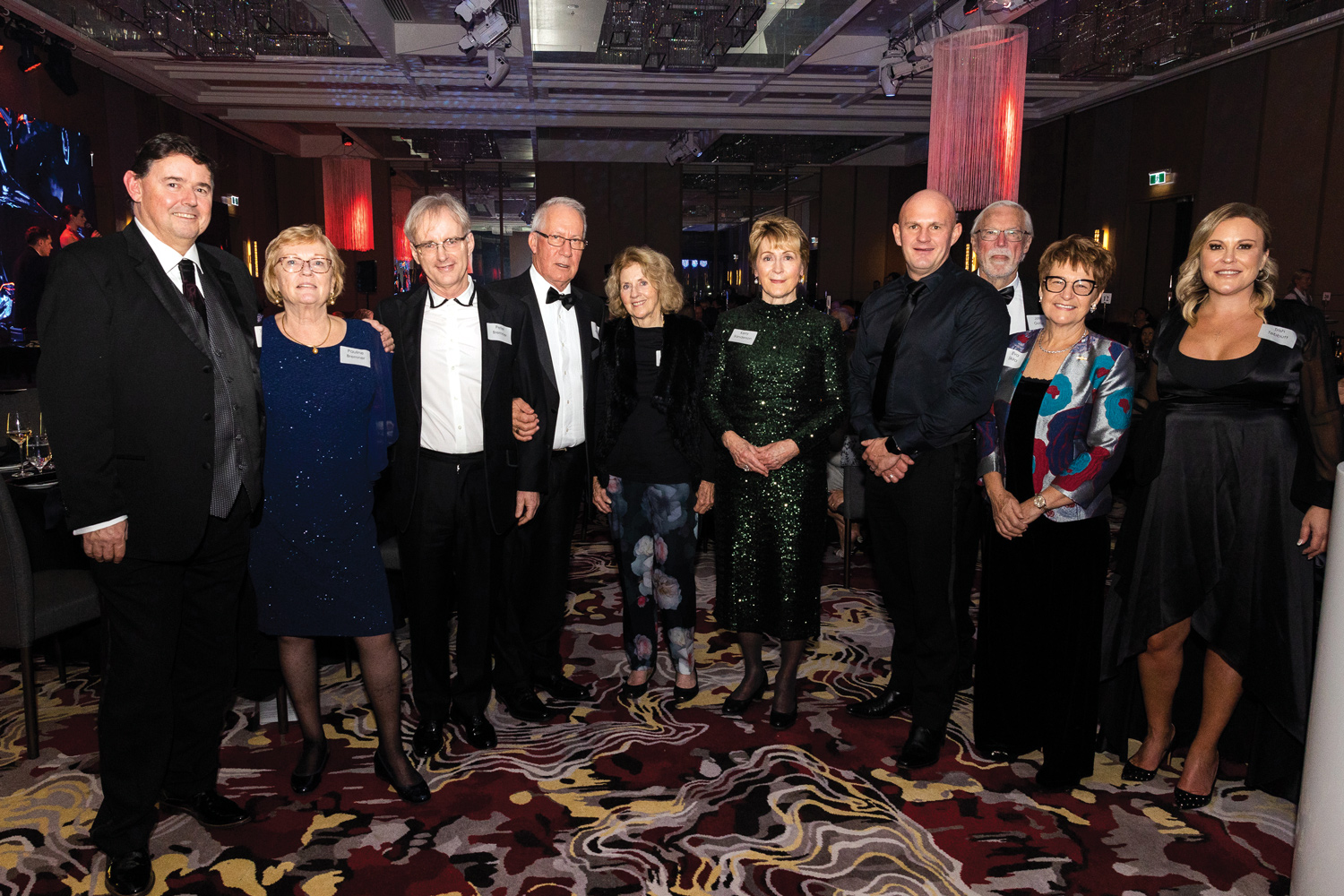
and Trish Tebbutt.

